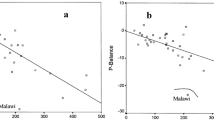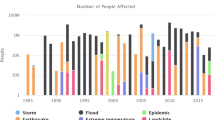Abstract
The possibility that climate change will increase the risk of civil war by causing agricultural decline, thereby increasing competition over scarce resources, is the focus of a vastly expanding research agenda. Yet, an emerging body of work suggests that agricultural abundance, not scarcity, drives violence. This study illustrates that debates over whether scarcity or abundance does more to drive violence can be adjudicated with greater attention to actor (government, rebel, or militia), violence, and crop types. It leverages new spatiotemporal monthly data to assess the relationship between local cash crop productivity and violence against civilians by state forces, rebels, and militias, accounting for the impact of climatic and socioeconomic indicators, across 14 countries in the Sahel between January 2006 and December 2018. Aggregating data on local agricultural production for 42 crops alongside a vegetation coverage indicator, a monthly measure of local cash crop productivity is created, and its impact on the monthly rates of violence against civilian by these three actors is estimated. Results indicate that rebel and militia attacks increase by about twofold in cash crop–producing locations during peak productivity months, whereas state force attacks do not. This suggests that nonstate actors are more dependent on local sources of revenue and follow demand-based incentives to use violence to facilitate appropriation.
Similar content being viewed by others
Data Availability
All replication data and scripts are available at: https://dataverse.harvard.edu/dataset.xhtml?persistentId=doi:10.7910/DVN/LDI5TK.
Notes
Mali, Senegal, Mauritania, Niger, Burkina Faso, Cameroon, Nigeria, Central African Republic, Chad, Ethiopia, Eritrea, Algeria, Sudan, and South Sudan.
For the specific crops grown in each location see Figure A1, supplementary material.
Data curation and replication files are available on Harvard Dataverse: https://doi.org/10.7910/DVN/LDI5TK.
The models do not include an intercept due to the reliance on the method designed to facilitate estimation of models with fixed effects developed by Gaure (2013).
The coefficient and 95% confidence intervals decrease in size in these models due to the wider range on this anomaly-based variable (− 5.886 7.306) compared with the standard Crop productivityit indicator (0 1).
References
Adano WR, Dietz T, Witsenburg K, Zaal F (2012) Climate change, violent conflict and local institutions in Kenya’s drylands. J Peace Res 49(1):65–80. https://doi.org/10.1177/0022343311427344
Angrist JD, Pischke JS (2009) Mostly harmless econometrics: an empiricist’s companion. Princeton University Press, Cambridge
Aune JB, Bationo A (2008) Agricultural intensification in the Sahel–the ladder approach. Ag Systems 98(2):119–125. https://doi.org/10.1016/j.agsy.2008.05.002
Benjaminsen TA, Alinon K, Buhaug H, Buseth JT (2012) Does climate change drive land-use conflicts in the Sahel? J Peace Res 49(1):97–111. https://doi.org/10.1177/0022343311427343
Biersteker TJ, Eckert SE, Tourinho M, Hudáková Z (2018) UN targeted sanctions datasets (1991–2013). J Peace Res 55(3):404–412. https://doi.org/10.1177/0022343317752539
Buhaug H (2010) Climate not to blame for African civil wars. Proc Nat Acad Sci 107(38):16477–16482. https://doi.org/10.1073/pnas.1005739107
Buhaug H, von Uexkull N (2021) Vicious circles: violence, vulnerability, and climate change. Ann Rev Env Resour 46:545–568. https://doi.org/10.1146/annurev-environ-012220-014708
Burke MB, Miguel E, Satyanath S, Dykema JA, Lobell DB (2009) Warming Increases the Risk of Civil War in Africa. Proc Nat Acad Sci 106(49):20670–20674. https://doi.org/10.1073/pnas.0907998106
Busetto L, Ranghetti L (2016) MODIStsp: An R package for automatic preprocessing of MODIS Land Products time series. Comp Geosci 97:40–48. https://doi.org/10.1016/j.cageo.2016.08.020
Cane MA, Miguel E, Burke M, Hsiang SM, Lobell DB et al (2014) Temperature and violence. Nat Clim Change 4(4):234–235. https://doi.org/10.1038/nclimate2171
Carey SC, Mitchell NJ, Lowe W (2013) States, the security sector, and the monopoly of violence: a new database on pro-government militias. J Peace Res 50(2):249–325. https://doi.org/10.1177/00223433124648
Caruso R, Petrarca I, Ricciuti R (2016) Climate change, rice crops, and violence: evidence from Indonesia. J Peace Res 53(1):66–83. https://doi.org/10.1177/0022343315616
Crost B, Felter JH (2020) Export crops and civil conflict. J Eur Econ Assoc 18(3):1484–1520. https://doi.org/10.1093/jeea/jvz025
Crost B, Duquennois C, Felter JH, Rees DI (2018) Climate change, agricultural production and civil conflict: evidence from the Philippines. J Environ Econ Manag 88:379–395. https://doi.org/10.1016/j.jeem.2018.01.005
Detges A (2014) Close-up on renewable resources and armed conflict: the spatial logic of pastoralist violence in northern Kenya. Pol Geog 42:57–65. https://doi.org/10.1016/j.polgeo.2014.06.003
Detges A (2017) Droughts, state-citizen relations and support for political violence in Sub-Saharan Africa: a micro-level analysis. Pol Geog 61:88–98. https://doi.org/10.1016/j.polgeo.2017.07.005
Didan, K, AB Munoz, R Solano, A Huete (2015) MODIS vegetation index user’s guide (MOD13 series). University of Arizona: Vegetation Index and Phenology Lab, p 35. https://modisland.gsfc.nasa.gov/pdf/MOD13_User_Guide_V61.pdf. Accessed 12 Dec 2021
Döring S (2020) Come rain, or come wells: how access to groundwater affects communal violence. Pol Geog 76:102073. https://doi.org/10.1016/j.polgeo.2019.102073
Dube O, Vargas JF (2013) Commodity price shocks and civil conflict: evidence from Colombia. Rev Econ Stud 80(4):1384–1421. https://doi.org/10.1093/restud/rdt009
Durmaz M (2022) How Burkina Faso became the epicentre of conflict in the Sahel. Al Jazeera March 11, 2022. https://www.aljazeera.com/features/2022/3/11/how-burkina-faso-became-the-new-epicentre-of-sahelian. Accessed 10 Jan 2023
Eke-okocha NP, Eze CG (2023) Boko Haram insurgency in North-Eastern Nigeria, how has this influenced food insecurity in the region?. In Integrated Approaches to Peace and Sustainability. Singapore, Springer Nature: 89–102. https://doi.org/10.1007/978-981-19-7295-9
Felbab-Brown V (2020) As conflict intensifies in Nigeria’s North East, so too does a reliance on troubled militias. Order from Chaos blog 21, Brookings Institution. April 21, 2020. https://www.brookings.edu/blog/order-from-chaos/2020/04/21/as-conflict-intensifies-in-nigerias-north-east-so-too-does-a-reliance-on-troubled-militias/. Accessed 10 June 2022
Fjelde H, Von Uexkull N (2012) Climate triggers: rainfall anomalies, vulnerability and communal conflict in sub-Saharan Africa. Pol Geog 31(7):444–453. https://doi.org/10.1016/j.polgeo.2012.08.004
Gaure S (2013) lfe: linear group fixed effects. R Journal 5.2: 104. https://journal.r-project.org/articles/RJ-2013-031/. Accessed 15 Sept 2022
Harris I, Osborn TJ, Jones P, Lister D (2020) Version 4 of the CRU TS monthly high-resolution gridded multivariate climate dataset. Sci Data 7(1):109. https://doi.org/10.1038/s41597-020-0453-3
Hendrix CS, Salehyan I (2012) Climate change, rainfall, and social conflict in Africa. J Peace Res 49(1):35–50. https://doi.org/10.1177/0022343311426165
HRW (2022) Burkina Faso. Human Rights Watch. https://www.hrw.org/africa/burkina-faso. Accessed 12 Feb 2023
Ide T, Brzoska M, Donges JF, Schleussner CF (2020) Multi-method evidence for when and how climate-related disasters contribute to armed conflict risk. Glob Env Change 62:102063. https://doi.org/10.1016/j.gloenvcha.2020.102063
Jaafar HH, Woertz E (2016) Agriculture as a funding source of ISIS: a GIS and remote sensing analysis. Food Pol 64:14–25. https://doi.org/10.1016/j.foodpol.2016.09.002
Kalyvas SN (2006) The logic of violence in civil war. Cambridge, Cambridge University Press. https://doi.org/10.1017/CBO9780511818462
Kelley CP, Mohtadi S, Cane MA, Seager R, Kushnir Y (2015) Climate change in the fertile crescent and implications of the recent Syrian drought. Proc Natl Acad Sci 112(11):3241–3246. https://doi.org/10.1073/pnas.1421533112
Koren O (2018) Food abundance and violent conflict in Africa. Am J Ag Econ 100(4):981–1006. https://doi.org/10.1093/ajae/aax106
Koren O, Bagozzi BE (2017) Living off the land: the connection between cropland, food security, and violence against civilians. J Peace Res 54(3):351–364. https://doi.org/10.1177/0022343316684543
Linke AM, Ruether B (2021) Weather, wheat, and war: security implications of climate variability for conflict in Syria. J Peace Res 58(1):114–131. https://doi.org/10.1177/0022343320973070
Lloyd CT, Chamberlain H, Kerr D, Yetman G, Pistolesi L et al (2019) Global spatio-temporally harmonised datasets for producing high-resolution gridded population distribution datasets. Big Earth Data 3(2):108–139. https://doi.org/10.1080/20964471.2019.1625151
Mach KJ, Kraan CM, Adger WN, Buhaug H, Burke M et al (2019) Climate as a risk factor for armed conflict. Nature 571(7764):193–197. https://doi.org/10.1038/s41586-019-1300-6
Magid Y, Schon J (2018) Introducing the African relational pro-government militia dataset (RPGMD). Int Interact 44(4):801–832. https://doi.org/10.1080/03050629.2018.1458724
Maystadt JF, Ecker O (2014) Extreme weather and civil war: does drought fuel conflict in Somalia through livestock price shocks? Am J Ag Econ 96(4):1157–1182. https://doi.org/10.1093/ajae/aau010
O’Loughlin J, Witmer FD, Linke AM, Laing A, Gettelman A et al (2012) Climate variability and conflict risk in East Africa, 1990–2009. Proc Natl Acad Sci 109(45):18344–18349. https://doi.org/10.1073/pnas.1205130109
Petrova K (2022) Floods, communal conflict and the role of local state institutions in Sub-Saharan Africa. Pol Geog 92:102511. https://doi.org/10.1016/j.polgeo.2021.102511
Raleigh C, Linke R, Hegre H, Karlsen J (2010) Introducing ACLED: an armed conflict location and event dataset. J Peace Res 47(5):651–660. https://doi.org/10.1177/002234331037891
Raleigh C, Choi HJ, Kniveton D (2015) The devil is in the details: an investigation of the relationships between conflict, food price and climate across Africa. Glob Env Change 32:187–199. https://doi.org/10.1016/j.gloenvcha.2015.03.005
Raleigh C, Dowd C (2013) Governance and conflict in the Sahel’s ‘ungoverned space’. Stability: J Security and Dev 2(2): https://doi.org/10.5334/sta.bs
Scheffran J, Ide T, Schilling J (2014) Violent climate or climate of violence? concepts and relations with focus on Kenya and Sudan. Int J Hum Rights 18(3):369–390. https://doi.org/10.1080/13642987.2014.914722
Schilling J, Akuno M, Scheffran J, Weinzierl T (2014) On raids and relations: climate change, pastoral conflict and adaptation in northwestern Kenya. In Conflict-sensitive adaptation to climate change in Africa, eds. Urmilla Bob and Salomé Bronkhorst, Adelphi: 241–261. https://catalogue.unccd.int/793_Conflict_Adaptation.pdf#page=243. Accessed 17 Mar 2023
Schmauder A (2021) Customary characters in uncustomary circumstances: the case of Burkina Faso’s east region. United States Agency for International Development USAID. December 2021. https://customarylegitimacy.clingendael.org/sites/default/files/2022-02/customary_legitimacy_Est_0.pdf. Accessed 17 Mar 2023
Schon J, Koren O (2022) Introducing AfroGrid, a unified framework for environmental conflict research in Africa. Sci Data 9(1):116. https://doi.org/10.1038/s41597-022-01198-5
Schon J, Koehnlein B, Koren O (2023) The need for willingness and opportunity: analyzing where and when environmental variability influences conflict in the Sahel. Pop Environ 45(1):2. https://doi.org/10.1007/s11111-023-00413-8
Selby J, Hoffmann C (2014) Rethinking climate change, conflict and security. Geopolitics 19(4):747–756. https://doi.org/10.1080/14650045.2014.964866
Sundberg R, Melander E (2013) Introducing the UCDP georeferenced event dataset. J Peace Res 50(4):523–532. https://doi.org/10.1177/0022343313484347
The World Bank (2022) World Development Indicators. Obtained using the “wbstats” package in R. Last updated December 5, 2020. https://cran.r-project.org/web/packages/wbstats/vignettes/wbstats.html. Accessed 2 Oct 2022
Theisen OM (2012) Climate clashes? weather variability, land pressure, and organized violence in Kenya, 1989–2004. J Peace Res 49(1):81–96. https://doi.org/10.1177/0022343311425842
UN (2021) Conflict, COVID, climate crisis, likely to fuel acute food insecurity in 23 ‘hunger hotspots’. United Nations Public Release. Last modified July 30, 2021 https://news.un.org/en/story/2021/07/1096812. Accessed 26 Feb 2023
Van Weezel S (2019) On climate and conflict: precipitation decline and communal conflict in Ethiopia and Kenya. J Peace Res 56(4):514–528. https://doi.org/10.1177/0022343319826409
Von Uexkull N, Buhaug H (2021) Security implications of climate change: a decade of scientific progress. J Peace Res 58(1):3–17. https://doi.org/10.1177/0022343320984210
Von Uexkull N, Croicu M, Fjelde H, Buhaug H (2016) Civil conflict sensitivity to growing-season drought. Proc Nat Acad Sci 113(44):12391–12396. https://doi.org/10.1073/pnas.1607542113
Weinstein JM (2006). Inside rebellion: the politics of insurgent violence.Cambridge, Cambridge University Press. https://doi.org/10.1017/CBO9780511808654
Wischnath G, Buhaug H (2014) On climate variability and civil war in Asia. Clim Change 122:709–721. https://doi.org/10.1007/s10584-013-1004-0
Yu Q, You L, Wood-Sichra U, Ru Y, Joglekar AK et al (2020) A cultivated planet in 2010–Part 2: the global gridded agricultural-production maps. Earth Syst Sci Data 12(4):3545–3572. https://doi.org/10.5194/essd-12-3545-2020
Funding
Koren’s research was supported by the Harry Frank Guggenheim Foundation and by the National Science Foundation under Grant No. SAP-2149053.
Author information
Authors and Affiliations
Corresponding author
Ethics declarations
Conflict of interest
The authors declare no conflict of interest. Justin Schon began employment at DHS after the data was collected and the original idea for the paper was conceived.
Disclaimer
This study does not reflect the views of the Harry Frank Guggenheim Foundation, the NSF, or the Department of Homeland Security (DHS).
Additional information
Communicated by Jamie Pittock
Publisher's Note
Springer Nature remains neutral with regard to jurisdictional claims in published maps and institutional affiliations.
Supplementary Information
Below is the link to the electronic supplementary material.
Rights and permissions
Springer Nature or its licensor (e.g. a society or other partner) holds exclusive rights to this article under a publishing agreement with the author(s) or other rightsholder(s); author self-archiving of the accepted manuscript version of this article is solely governed by the terms of such publishing agreement and applicable law.
About this article
Cite this article
Koren, O., Schon, J. Climate change, cash crops, and violence against civilians in the Sahel. Reg Environ Change 23, 112 (2023). https://doi.org/10.1007/s10113-023-02090-7
Received:
Accepted:
Published:
DOI: https://doi.org/10.1007/s10113-023-02090-7




